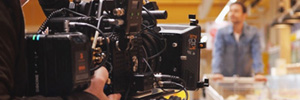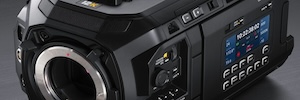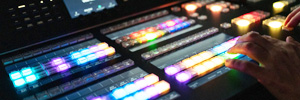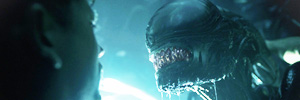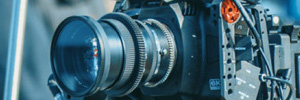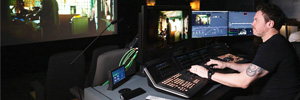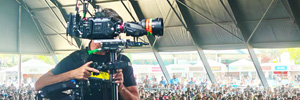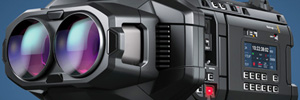Blackmagic, omnipresent in the filming and post-production of ‘Avatar: The Way of Water’
Improving every single technological process was the only way to take the visual spectacle to a new level in Avatar: The Way of Water. Jon Landau and James Cameron’s production company Lightstorm Entertainment relied on Blackmagic solutions to achieve all of its ambitious goals.
For Avatar: The Way of Water, Geoff Burdick, Lightstorm’s vice president of production technology and services, researched the market for solutions that would “challenge the skills and capabilities of the most advanced production pipeline”.
As Burdick himself conveys, dealing with a production as complex as Avatar is more than just processing data; you also have to have the “tools to evaluate content as it’s being shot: “We evaluate live camera feeds in a manner as close to the theatrical experience as possible, so we can make real time decisions on set. This saves time during shooting, benefits Weta Digital, our visual effects vendor, and helps streamline our post production and mastering process.”
The production team’s intention was to shoot in 4K HDR at a frame rate of 47,952 f/sec. This setup would provide stereoscopic format compatibility, but would also add complexity to data management on set: “We needed to enable that spec through our entire production pipeline, involving real time feeds to our DCI compliant ‘projection pod,’ which we used to view live camera feeds in 3D 48fps in both 2K e 4K, 3D 24fps in 2K e 4Ke 3D 24fps in HD. Obviously, there wasn’t a lot of existing hardware available to support that.”
Burdick and his team contacted Blackmagic Design, to whom they explained their goals: “There were no instant answers, but they understood the vision, and had ideas as to the best pathways to make it happen,” Burdick remarks.
Blackmagic solutions in the Avatar pipeline
Burdick and his team worked closely with Robin Charters, an engineer at 3D Systems, and began to refine every technological aspect that would shape Avatar: The Way of Water. Ultimately, they chose to incorporate a Teranex AV converter, a Smart Videohub 12G 40×40 matrix, a DeckLink 8K Pro capture and playback card, an UltraStudio 4K Extreme 3 device and an ATEM 4 M/E Broadcast Studio 4K mixer to process the various signals.
The workflow ran smoothly and without a hitch. Real-time conversions were carried out with the Teranex AV device, whose signals were transmitted to the Smart Videohub 12G 40×40 matrix, and the ATEM 4 M/E Broadcast Studio 4K mixer provided the ability to playback and review the footage on set. As well as being able to evaluate the material immediately, having a playback system in different resolutions was also useful as a necessary solution for quality control: “This is very important as we move into shooting higher resolutions, frame rates and dynamic ranges, with exhibition technologies capable of displaying all this and more.”
Colour grading with DaVinci Resolve Studio
Colourist Tashi Trieu has worked for years with Lightstorm Entertainment as an editor on digital intermediates, including projects such as Terminator 2 and Alita: Combat Angel. For Avatar: The Way of Water, Trieu collaborated as colourist with director James Cameron.
The development of the film’s aesthetics, says Trieu, was primarily done at WetaFX: “Jim has a close relationship with them and as the principal visual effects vendor on the project, their artistry is thoroughly ingrained in everything from live action capture through fully CGI shots.” At this stage, the visualisation conversion table (LUT), “an elegantly simple S curve with a straightforward gamut mapping from SGamut3.Cine to P3D65“, was finally defined, providing “plenty of flexibility to push moments of the film more pastel or into an absolutely photorealistic rendition.”
When it came to colour, Tashi Trieu worked with DaVinci Resolve Studio software, actively participating in the conforming and editing professions: “I spent almost as much time on the Edit page as I did in Color. I didn’t go into Fusion on this job, but that’s mostly due to the improvements in the ResolveFX toolset. Almost everything I needed to do beyond the grade could be done with those tools right on the Color page. This was advantageous because those grades could be easily ColorTraced and propagated across multiple simultaneous grades for different aspect ratios and light levels.”
The challenges of post-production on Avatar: The Way of Water
For Trieu, Avatar: The Way of Water was a “double challenge” because not only was it stereoscopic, but also because it was working at a high frame rate (48 f/s): “Even on a state of the art workstation with 4x A6000 GPUs, real time performance is difficult to guarantee. It’s a really delicate balance between what’s sustainable over the SAN’s bandwidth and what’s gentle enough for the system to decode quickly. Every shot was delivered as OpenEXR frames with as many as five or six layers of mattes for me to use in the grade. Ian Bidgood at Park Road had a really clever idea to have WetaFX write the RGB layer as uncompressed data, but ZIP compress the mattes within the same file. This meant we had rock solid playback performance, really fast rendering for deliverables, and the file sizes were barely more than if they didn’t contain the mattes.”
Another key to the colour grading was the ability to work in Dolby Vision 3D at 14fL with extended dynamic range, a setting that Trieu considers “a great way to work because you can see everything so well”. Once the colour grading is complete in this format, “is a relatively simple transformation, with some custom trims. You lose your deep blacks with a traditional DLP projector, but it’s just as bright as Dolby 3D.”
Avatar: The Way of Water included a significant number of scenes with high production and post-production demands. However, Trieu recalls one in particular that was particularly complex: “There’s a “town hall” scene between the Sully family and the Metkayina clan that takes place during a rainstorm. It’s an absolutely gorgeous scene that evokes Rembrandt. The cold, overcast skies wrap around the characters and a subtle warm accent light gives the scene a really nice dynamic. It’s insane how absolutely real everyone looks. You have to actively remind yourself, “everything in this shot is artist generated, none of this beyond the actors’ performances is ‘real’ per se.” It’s truly a generational leap in visual effects artistry and technology. It’s absolutely extraordinary.”
Ti è piaciuto questo articolo?
Iscriviti al nostro Nutrire e non ti perderai nulla.



